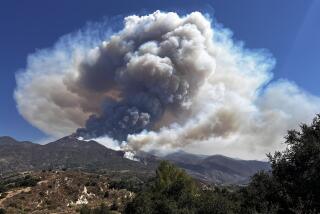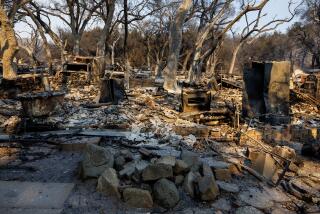Allstate Seeking Redress in S.D. Fire
SAN DIEGO — Bungling by fire and police agencies here allowed last October’s Cedar fire to spread “into a wildfire of epic proportion,” one of the largest insurance companies in the state has charged in a claim filed against three public agencies.
Allstate Corp., which expects to pay out between $290 million and $330 million to policyholders as a result of last fall’s fires, is demanding that the city and county of San Diego as well as the California Department of Forestry and Fire Protection help it cover the costs because it says they did an incompetent job of fighting the most costly of the blazes, the Cedar fire.
The agencies have rejected the claim, which accuses emergency officials of “gross malfeasance” in allowing the fires to blacken 300,000 acres across San Diego County’s backcountry and destroy 2,300 homes. Officials said a state law provides governments virtual blanket immunity to lawsuits arising from firefighting efforts.
Candysse Miller, executive director of the Insurance Information Network of California, a trade group for insurance companies, said that San Diego was the only city or county to face such a claim and that Allstate was the only company to file such a claim.
The October wildfires struck parts of San Bernardino, Riverside, Los Angeles and Ventura counties.
Even if Allstate does not pursue its claim in court, she added, the insurance giant is “sending a message” that could result in future lawsuits if San Diego officials fail to bolster their fire protection efforts.
Allstate spokesman Bill Mellander said no decision had been made by the company on whether to file a lawsuit. The claim filed this week was the first step required before a lawsuit can be filed.
“In the face of possible negligence that may have caused damage to our policyholders, we are serving notice that gives us the time and ability to weigh all our possible options,” Mellander said.
The government response in the early hours of the Cedar fire has been a source of debate. Fire officials have said that they were hampered by poor communications and a lack of resources and that some of their early tactical decisions did little to slow the fire’s spread.
Critics say San Diego has ignored numerous warnings over the last 20 years that its fire agencies were woefully understaffed and could not respond effectively to a major brush fire.
Though the problems stated in Allstate’s claim -- lack of helicopters and aerial tankers, radio foul-ups and poor coordination -- have been documented by the agencies in their “after-action” reports, the insurance company’s language is some of the toughest that has been applied to the firefighting effort.
Fire officials, in the early stages of the fire, showed “a complete disregard” for calls from panic-stricken homeowners, resulting in a “lack of coordination by governmental officials responsible for organizing and dispatching appropriate firefighting efforts,” the insurance company charged.
In December, a report by the San Diego Fire Department said the agency was hampered by a lack of manpower, equipment and training and had problems with communication and coordination in fighting the Cedar fire, which destroyed homes in two of the city’s pricier neighborhoods, Tierrasanta and Scripps Ranch.
In March, a task force assembled by the forestry department reached a similar conclusion about all the agencies that fought the fires in the county.
San Diego County is the only large county in the state without a countywide fire department. And the city of San Diego has one of the lowest number of firefighters of any large city in the nation.
Historically, San Diego County officials and residents have been resistant to approving increased taxes for fire protection. In fact, four of seven fire-protection measures on the March ballot failed to win passage, just four months after the Cedar blaze and nearby Paradise fire.
Allstate’s claims were rejected by the San Diego City Council, the San Diego County Board of Supervisors and the state’s Victim Compensation and Government Claims Board on behalf of the forestry department.
In rejecting the claim, the state board seemed to invite a lawsuit. The claim “raises complex issues of fact and laws that should be resolved through legal action,” the board stated.
“The next move is Allstate’s,” said Bruce Crane, staff attorney for the forestry department.
Attorneys for the public agencies said Allstate would have little chance of overcoming the state law giving government agencies immunity against firefighting claims.
Nate Northrup, chief deputy counsel for San Diego County, said that state legislators, in adopting the immunity law, realized that government has its limits.
“They realize that when governmental officials have to make difficult decisions about limited resources, public entities cannot always guarantee they can do everything we’d like to do,” he said.
Some took issue with what they considered the harsh, accusatory tone of Allstate’s claim.
“The insurance companies have their own agendas: to take the facts and shape them in ways that benefit their bottom line,” said Councilman Michael Zucchet, a former lobbyist for the San Diego firefighters union.
A private attorney in San Diego who is suing Allstate for allegedly underinsuring homeowners seeking payment for losses in the Cedar fire described the company’s claims as “ludicrous.”
“Basically what they’re saying is that ‘yes, we underinsured our policyholders, but for those pitiful claims we’ve paid, we want the taxpayers to pick up the bill,’ ” said attorney Harvey Levine, who in 1998 represented policyholders in a class-action suit in which Allstate paid $120 million. “This is arrogance at its worst.”
More to Read
Sign up for Essential California
The most important California stories and recommendations in your inbox every morning.
You may occasionally receive promotional content from the Los Angeles Times.










